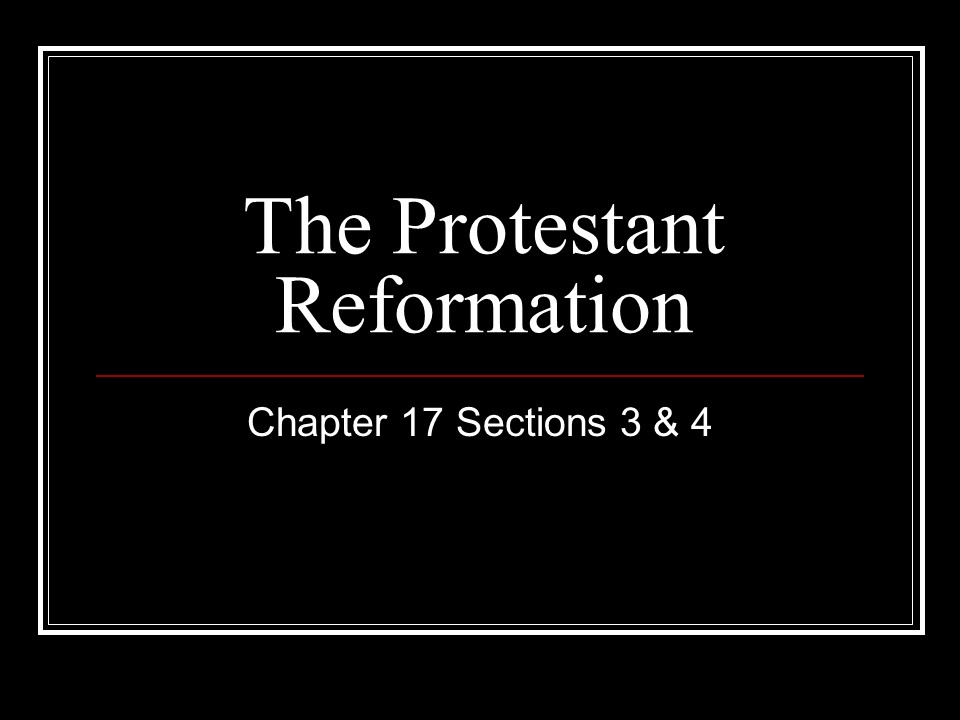The Protestant Reformation - PowerPoint PPT Presentation
Title:
The Protestant Reformation
Description:
The Protestant Reformation Chapter 17 Sections 3 & 4 – PowerPoint PPT presentation
Number of Views:368
Avg rating:3.0/5.0
Title: The Protestant Reformation
1
The Protestant Reformation
- Chapter 17 Sections 3 4
2
Causes of the Reformation
- Renaissance ideas (humanism, glorification of the
individual) - The Catholic Church after the Middle Ages was
weaker (plague, political control) - Printing press (allowed information to spread
faster, allowed lay people to read the Bible for
themselves)
3
Northern Renaissance(Christian) Humanism
- Taken from Italian Renaissance humanisms study
of the classics - Goal was to reform Christendom
- Desiderius Erasmus
- Studied original Christian texts
- Praise of Folly (1511) criticized popes
4
Corruption of the Church
- Renaissance Popes (1450 1520)
- Worried about Italian politics (Papal States)
- Financial problems (buying art)
- Pluralism multiple church offices
- Absenteeism
- Indulgences
- Selling salvation to raise revenue
- People wanted a more meaningful religious
experience
5
Martin Luther
- Born in Germany (Nov. 10, 1483)
- Studied law until deciding to become a monk
- Never felt that God would accept him
- Studied the Bible
- Came to a new idea justification by faith
- Salvation was not through good works, but through
faith
6
Martin Luther vs. the Church
- Selling of indulgences angered Luther
- Johann Tetzel was the local bishop in Wittenberg
- Ninety-Five Theses (October 31, 1517)
- Wittenberg, Germany
- Attack on the church and the sell of indulgences
- Printed copies spread throughout Germany
7
(No Transcript)
8
Luther vs. the Holy Roman Empire
- Pope Leo X excommunicates Luther in Jan. 1521
- Diet of Worms (1521)
- Charles V (Holy Roman Emperor) orders Luther to
recant (take back) - Luther refuses
- Edict of Worms
- No one in the empire is allowed to give food or
shelter to Luther - Frederick the Wise of Saxony gives Luther
protection - 1522 Luther returns from exile and finds that
he has gained followers
9
(No Transcript)
10
Lutheranism
- The Lutheran Faith developed as a new Christian
Church - Translated New Testament into German
- Salvation through faith alone (not through the
church) - Bible is only source of religious truth
- Peasants Revolt (1524)
- Peasants demand an end to serfdom
- Luther sided with the princes to keep peace
- Luther loses support of many peasants
- German religious wars
- Some princes sign an agreement with Charles V to
fight against the Lutherans - Some princes sign an agreement to fight Charles V
the Catholic Church - Peace of Augsburg (1555)
- Each German prince would decide the religion of
their area
11
English Religious Reform
- Henry VIII wanted a male heir
- Catherine of Aragon daughter Mary
- Nephew was Charles V of HRE
- Asked pope for a divorce, pope denied
- Henry turns to Parliament for help
- Act of Supremacy (1534) King became head of
English church, not the pope - New Church called the Church of England or
Anglican Church - Church keeps most Catholic traditions
12
English Religious Reform
- Henrys Wives
- 6 wives 1 son
- Edward VI
- Sickly, dies in his teens
- Protestant reforms put in changes to the Anglican
Church - Mary (Bloody Mary)
- Returned England to a Catholic a nation
- Burned Protestants at the stake
- Elizabeth I
- Protestant who re-established the Anglican Church
- Puritans purify the English church
13
Swiss Reforms (Zwinglianism)
- Huldrych Zwingli (1484 1531)
- Like Lutheranism salvation through faith alone
- Different
- Wanted a theocracy (church city-state) in Zurich
- Zwinglis forces defeated by Catholics
14
Swiss Reforms (Calvinism)
- John Calvin
- Studied theology, law, and humanism
- Predestination belief that God is all powerful
and predestined those who were saved - Geneva began to reform as a theocracy
- Calvinism Spreads
- John Knox spreads ideas to Scotland
(Presbyterians) - Huguenots in France
- St. Bartholomews Day Massacre
15
Anabaptists
- Did not want states to have power over religion
- Favored by middle and lower class
- Adult baptism, all members equal
- Separation of church and state
- Would not hold political office or fight in the
army - Persecuted by Catholics Protestants
- Forerunners of Mennonites and the Amish
- Influenced the Quakers and Baptists
16
Catholic Reformation
- Ignatius of Loyolas teachings become the
foundation of the Society of Jesus - Followers called Jesuits
- 3 Goals
- Create schools to teach classical studies and
religion - Missions to spread Catholicism (missionaries sent
around the world) - Stop the spread of Protestantism
17
Catholic Reformation
- Council of Trent (1545 1563)
- Re-affirmed traditional Catholic beliefs
- Churchs interpretation of the Bible was final
- Need faith and good works for salvation
- Bible and Church were equally powerful
authorities - False selling of indulgences was banned
- Pope Paul IV has forbidden books burned
18
Effects of the Reformation
- Religious
- New denominations and churches flourish
- Catholics Church becomes more centralized
- Political
- Decrease of church power leads to the formation
of the modern nation-states - Social
- Questioning of the church leads to the
Enlightenment































